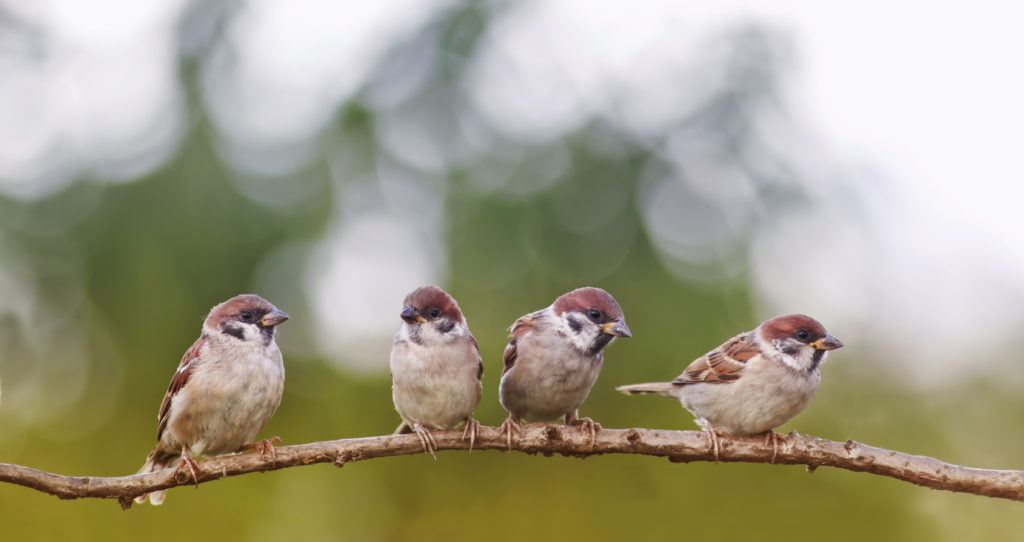Quick Hits
Daily brief research updates from the cognitive sciences

Waking up to an early morning chorus of birdsong is nice. No doubt about that. But the benefits could be much more significant than just a fleeting feeling of positivity (and followed by a groan to get out of bed by some).
Researchers at Kings College London have just reported on the results of a study that tracked people’s exposure to birdsong and the resulting mental health impact – with some very positive results.
Hammoud et al. tracked 1’292 participants over three years who completed an impressive 26’856 assessments. They used an app that asked them three times a time whether they could hear birdsong and then followed up with questions on mental health.
What did they find?
They found that seeing or hearing birds was associated with an improvement in wellbeing and that this can last up to eight hours. Not bad for a bit of birdsong. What’s more they also found that this also improved wellbeing in those suffering from depression.
This supports plenty of other research into the benefits of nature and specifically of just birdsong. I reported on the positive effects of biodiversity and birdsong here. But these researchers were also able to account for co-occurring other environmental factors such as seeing tress – we also know greenspace has a positive benefit – and found that birdsong alone could account for positive benefits.
So, that’s all good news – surprising and effective method to improve mental wellbeing – so open the windows and listen to the birds. It will do you good.

Andy Habermacher
Andy is author of leading brains Review, Neuroleadership, and multiple other books. He has been intensively involved in writing and research into neuroleadership and is considered one of Europe’s leading experts. He is also a well-known public speaker, speaking on the brain and human behaviour.
Andy is also a masters athlete (middle distance running) and competes regularly at international competitions (and holds a few national records in his age category).
References
Ryan Hammoud, Stefania Tognin, Lucie Burgess, Nicol Bergou, Michael Smythe, Johanna Gibbons, Neil Davidson, Alia Afifi, Ioannis Bakolis, Andrea Mechelli.
Smartphone-based ecological momentary assessment reveals mental health benefits of birdlife.
Scientific Reports, 2022; 12 (1)
DOI: 10.1038/s41598-022-20207-6
More Quick Hits
So, Meditation Doesn’t Change Your Brain – Or Does It?
editation can actually change your brain. "Oh, no it can’t!" say these researchers. "Oh, yes it can!" say a lot of other researchers. Does this start to sound confusing? Well, it does because there has been plenty of evidence that...
The Life Factors that Make Lonely People Lonely
Quick HitsDaily brief research updates from the cognitive sciences ou may assume, logically at first glance, that not having contact to people is the most important factor in loneliness. And obviously this does have a large impact — but...
How Music Helps With Collective Grief
his study recently out analyses a fascinating episode in China at the start of the pandemic. A group of international musicians in Shenzhen produced a viral hit in China. This was a cover version of Michael Jackson's “you are not alone”...
Why it pays for companies to help workers have a good day in the office
usiness and executives in those businesses are more than keen to get a competitive advantage. To this end they invest heavily in technology and getting the right people to do the job. But, I am sure, we are all more than aware that the work...
Vaccination to Keep Your Memory?
Quick HitsDaily brief research updates from the cognitive sciences ho wouldn’t want to keep their memory when aging?! Well, researchers have just announced some promising results in mice enabling them to keep their memories and avoid some of...
Can Having More Children Reduce Cognitive Functioning?
Quick HitsDaily brief research updates from the cognitive sciences aving more children and late life cognition is not something that is generally researched. There are more obvious avenues such as diet, education, exercise, or socio-economic...






